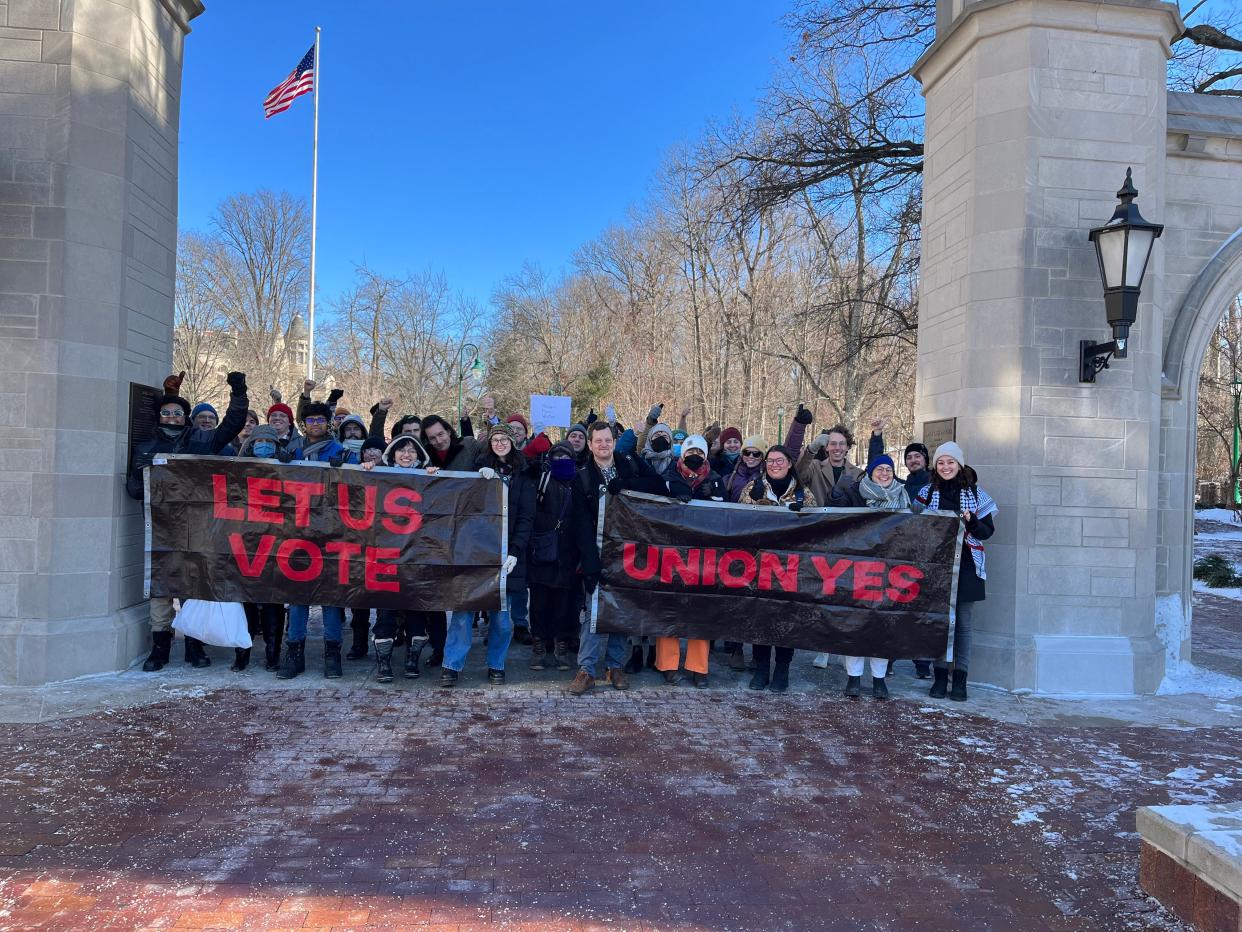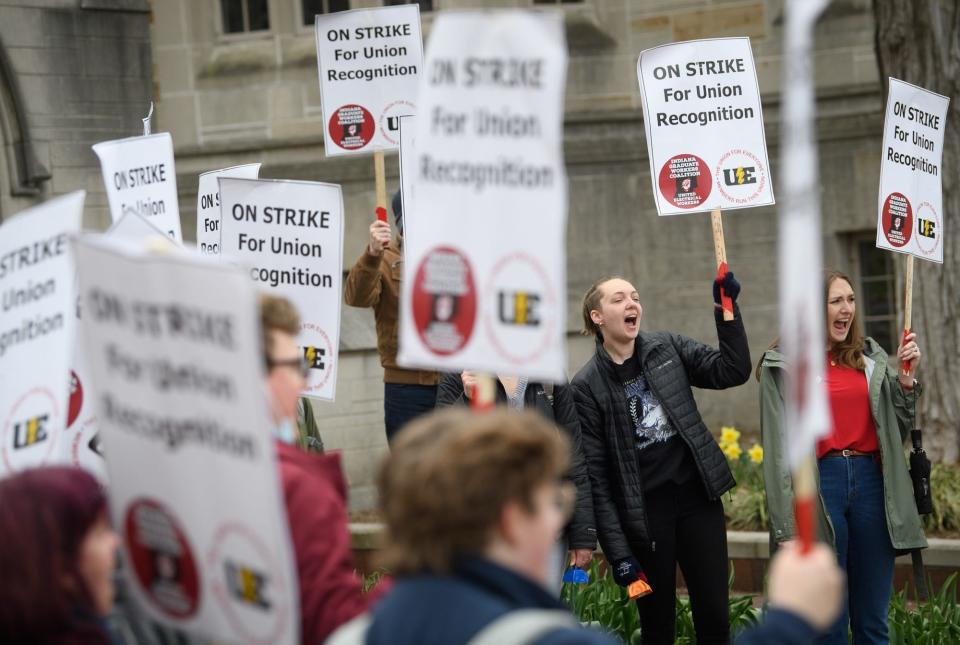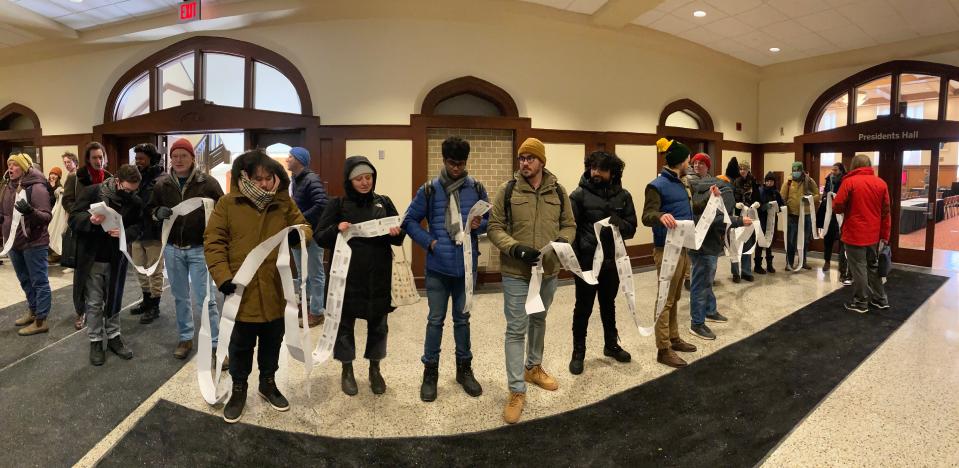Indiana University graduate workers try again for union recognition

On Jan. 16, members of the Indiana Graduate Workers Coalition delivered a letter to Indiana University President Pamela Whitten’s office asking the administration, again, to recognize and provide a pathway to unionization. The students also asked the university to pay graduate workers a “living wage,” as calculated by MIT’s Living Wage Calculator.
The letter included more than 1,300 signatures from its graduate workers, known at IU as Student Academic Appointees (SAAs). It asks the administration to provide “a pathway to unionization that would mirror the typical process established by the National Labor Relations Board (NLRB),” with an elected committee of graduate employees negotiating a contract with the administration through collective bargaining. The letter also asks the administration to recognize the IGWC as “the exclusive bargaining representative of graduate employees at IU,” and requests Whitten’s office respond by Jan. 29.
The fight for a union election continues

The IGWC’s last public, concerted effort to unionize was in the spring and summer of 2022, during which members engaged in a four-week strike. The strikes resulted in a slew of victories. IU increased its 10-month SAA stipends from $15,000 to $22,000, instituted a biannual review of SAA stipend, waived SAA’s $1,435 mandatory fee, and made improvements to the worker grievance process.
IU credited a Provost-convened task force – recommendations from which mirrored several of the IGWC’s demands – for the changes, but the IGWC said it stopped short of meeting some of the coalition’s core demands, including cost-of-living adjustments and improved health and parental benefits.
IU’s administration and its Board of Trustees did not recognize the union or enter into a collective bargaining process, despite the coalition garnering over 1,200 signatures from the approximately 2,500 graduate workers – a number well above the 30% threshold that would typically initiate an election to certify a union under National Labor Relations Board law.

NLRB law only covers the private sector, excluding state employees like IU SAAs. Indiana state law makes specific exceptions for employees of state educational institutions, protecting their right to enter into collective bargaining and form “employee organizations.” IU Human Resources policies also lay out further provisions for recognizing employee organizations and conducting elections that largely mirror NLRB law – yet they lack the NLRB’s provisions for establishing a timeline for hearings and elections at “the earliest date practicable.”
In 2022, IU leaders said the graduate workers are not employees and the trustees said student unionization is "incompatible with IU’s approach to shared governance."
Anne Kavalerchik, coordinating officer for the IGWC, said IU’s decision to not only refuse recognition of the union, but further refuse to hold an election, is rare compared to other universities – both private and public – whose graduate workers have unionized in recent years, including Duke University and University of Minnesota.
Coalition rallies around “living wage”
The coalition’s letter asked IU to meet the “living wage” minimum prescribed by the MIT Living Wage Calculator, defined as the wage, “one full-time worker must earn on an hourly basis to help cover the cost of their family’s minimum basic needs where they live while still being self-sufficient.” The annual income a single adult with no children would need to make a “living wage” in Bloomington is $33,568, or $27,973 for a 10-month contract salary. SAA 10-month contracts disbursed a minimum of $22,000 for the 2023-24 academic year.
The coalition also pushed for a living wage back in 2022, which at the time worked out to approximately $23,000 for its 10-month contracts – a figure that was nearly achieved by IU’s increases in 2022. But since, pay needed to achieve a living wage in Bloomington has increased by nearly $5,000. IU provides health insurance to its SAAs; the MIT calculator estimates medical costs make up $3,238 of the living wage calculation.
Kavalerchik said the coalition’s renewed demand for wages that keep pace with the rate of inflation underscores the need for a formal spot at the bargaining table.
“Graduate workers are still living $10,000 below the living wage in Bloomington, Indiana, and Monroe County,” Kavalerchik said. “We can’t hold the university accountable to actually supporting graduate education and research at this university without having a union.”
IUB Graduate School Dean David Daleke was charged by the provost to routinely benchmark stipends “against our peers to ensure that minimum stipends for student academic appointees remain in the top half of public Big Ten institutions.” In a memo published Jan. 12, Daleke recommended, and the provost approved, an increase in 10-month stipends to $23,000, effective Jul. 1, 2024.
The IGWC’s letter requests a meeting with Whitten’s office staff to begin the election planning process, and requests an election occur during the current semester.
“Again, we look forward to a lasting and productive bargaining relationship with you,” the letter reads.
Kavalerchik said she’s optimistic about the IGWC’s renewed efforts to unionize, and hopes IU's administration will be receptive.
“We can’t actually win long-term, sustainable gains without a union,” Kavalerchik said. “We’re giving them the opportunity to come to recognize us and come to the bargaining table in good faith.”
Reach Brian Rosenzweig at brian@heraldt.com.
This article originally appeared on The Herald-Times: IU graduate workers ask Whitten's office for union vote

